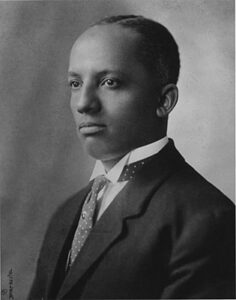Black History Month is celebrated in February each year. Where did it come from, and should we be celebrating it?
In 1926, the Association for the Study of Negro Life and History announced the second week of February as Negro History Week. Organizers selected this time to include Abraham Lincoln’s February 12 and Frederick Douglas’ February 14 birthdays. Declaring a week at this time was a natural extension of celebrations of the two birthdays.
Why Black History Month?
Advocates of Negro History Week wanted attention in the schools to Black history. They saw this as necessary to preserve any sense of Black identity. Historian Carter G. Woodson wrote that
If a race has no history, it has no worthwhile tradition, it becomes a negligible factor in the thought of the world, and it stands in danger of being exterminated. The American Indian left no continuous record. He did not appreciate the value of tradition; and where is he today?
Why Not Black History Month?
In 2005, actor Morgan Freeman was interviewed by Mike Wallace on “60 Minutes” about Black History Month. We agree completely that “Black history” is part of American history. Freeman reiterated his “detest” for the “mere idea” of Black History month in a recent Variety interview.
We agree with Freeman and his assessment that black history is American history. There is no White History Month or Jewish History Month, etc. We believe that segregating people on racial lines is counterproductive.
Integration of “Black History” into American History
It is true that because of discrimination, we might find a group systematically overlooked. We could also see selective inclusion of members of a group to support an agenda. An agenda could be either exalting or demonizing the group. Neither is acceptable in writing honest history. We invite readers to research these individuals as noteworthy figures in American history who may not be as well known as perhaps they should be.
Seventeenth Century
- Anthony Johnson (1600-1670) – First legally recognized slaveholder in the American Colonies
- John Casor – Anthony Johnson’s indentured servant, recognized as a permanent servant (essentially a slave) by a court in 1653
- “Adam” – indentured servant of John Saffin (1626-1710) who did not plan to give him his freedom when term of indenture was up, leading to prolonged legal battle and dueling books
Eighteenth Century
- Crispus Attucks (ca 1723 – 1770) – The first person killed in the Boston Massacre, and therefore, regarded as the first person killed in the American Revolutionary War
- Benjamin Banneker (1731-1806) – Astronomer, Surveyor, Mathematician, and Farmer; writer of almanacs
- Lucy Terry (1733-1821) – Slave brought to Rhode Island, and one of the earliest slave authors, writing poetry as early as 1746, which was preserved orally until published well after her death
- Prince Hall (1735-1807) – Boston Abolitionist; founder of Black Freemasonry; leader of Return-to-Africa Movement
- Barzillai Lew (1743-1822) – Noted Revolutionary War soldier, who fought at Bunker Hill and other key battles
- Elizabeth Freeman (1744-1829) – A slave, she filed one of the earliest freedom suits in Massachusetts helping abolish slavery in Massachusetts in the same period as Quock Walker
- Absalom Jones (1746-1818) – Abolitionist, founded first Black Episcopalian congregation, and first Black American to be ordained an Episcopal priest in the United States
- Salem Poor (1747-1802) – Slave who purchased his own freedom, served in Continental Army during Revolution
- Quock Walker (1753-?) – Filed a freedom suit in 1781, claiming slavery was outlawed by the 1780 Constitution of Massachusetts, establishing end of legal slavery in Massachusetts
- Titus “Colonel Tye” Cornelius (1753-1780) – Loyalist during Revolutionary War, who served in the British Army
- Phyllis Wheatley (1753-1784) – Slave brought from West Africa; early poet
- James Derham/Durham (1762-1802) – Emancipated slave, who became first Black physician
- Alexander Lucius Twilight (1795-1857) – Ordained Congregationalist minister; graduated from Middlebury College in 1823, first Black college graduate in United States
Nineteenth Century
- Alexander Augusta (1825-1890) – Physician, commissioned in Union Army in 1863; first Black professor of medicine in United States
- Nancy Green (1834-1923) – The first “living trademark,” as the original Aunt Jemima, who used her position to advocate for equal rights and fight against poverty
- Robert Smalls (1839-1915) – Born in slavery in South Carolina; after Civil War entered politics, serving in South Carolina State Senate; helped found Republican Party of South Carolina; first elected to U. S. House of Representatives in 1875
- Booker T Washington (1856-1915) – A former slave who wrote an autobiography titled Up From Slavery that we recommend to our readers
